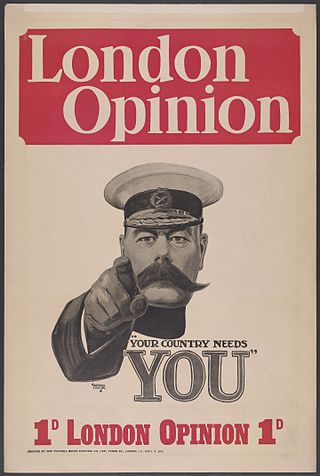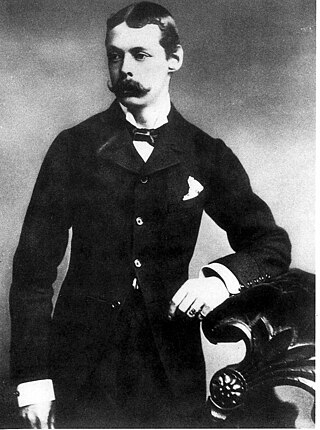Related Research Articles

Conscription, also known as the draft in American English, is the practice in which the compulsory enlistment in a national service, mainly a military service, is enforced by law. Conscription dates back to antiquity and it continues in some countries to the present day under various names. The modern system of near-universal national conscription for young men dates to the French Revolution in the 1790s, where it became the basis of a very large and powerful military. Most European nations later copied the system in peacetime, so that men at a certain age would serve 1 to 8 years on active duty and then transfer to the reserve force.

At the beginning of 1914 the British Army had a reported strength of 710,000 men including reserves, of which around 80,000 were professional soldiers ready for war. By the end of the First World War almost 25 percent of the total male population of the United Kingdom of Great Britain and Ireland had joined up, over five million men. Of these, 2.67 million joined as volunteers and 2.77 million as conscripts. Monthly recruiting rates for the army varied dramatically.

National service is the system of compulsory or voluntary government service, usually military service. Conscription is mandatory national service. The term national service comes from the United Kingdom's National Service Act 1939.

The Conscription Crisis of 1917 was a political and military crisis in Canada during World War I. It was mainly caused by disagreement on whether men should be conscripted to fight in the war, but also brought out many issues regarding relations between French Canadians and English Canadians. The vast majority of French Canadians opposed conscription; they felt that they had no particular loyalty to either Britain or France. Led by Henri Bourassa, they felt their only loyalty was to Canada. English Canadians supported the war effort as they felt stronger ties to the British Empire. On January 1, 1918, the Unionist government began to enforce the Military Service Act. The Act caused 404,385 men to be liable for military service, from which 385,510 sought exemption.

Field Marshal Frederick Sleigh Roberts, 1st Earl Roberts,, was a British Victorian era general who became one of the most successful British military commanders of his time. Born in India to an Anglo-Irish family, Roberts joined the East India Company Army and served as a young officer in the Indian Rebellion during which he was awarded the Victoria Cross for gallantry. He was then transferred to the British Army and fought in the Expedition to Abyssinia and the Second Anglo-Afghan War, in which his exploits earned him widespread fame. Roberts would go on to serve as the Commander-in-Chief, India, before leading British Forces for a year during the Second Boer War. He also became the last Commander-in-Chief of the Forces before the post was abolished in 1904.

Conscription in Australia, also known as National Service following the Second World War, has a controversial history which dates back to the implementation of compulsory military training and service in the first years of Australia's nationhood. Military conscription for peacetime service was abolished in 1972.

Military service is service by an individual or group in an army or other militia, air forces, and naval forces, whether as a chosen job (volunteer) or as a result of an involuntary draft (conscription).

Compulsory military training (CMT), a form of conscription, was practised for males in New Zealand between 1909 and 1972. Military training in New Zealand has been voluntary before then and ever since.
The Yearly Meeting of Aotearoa/New Zealand is the umbrella body and Yearly Meeting of the Religious Society of Friends in New Zealand.

The Conscription Crisis of 1918 stemmed from a move by the British government to impose conscription in Ireland in April 1918 during the First World War. Vigorous opposition was led by trade unions, Irish nationalist parties and Roman Catholic bishops and priests. A conscription law was passed but was never put in effect; no one in Ireland was drafted into the British Army. The proposal and backlash galvanised support for political parties which advocated Irish separatism and influenced events in the lead-up to the Irish War of Independence.

Taiwan, officially the Republic of China (ROC), maintains an active conscription system in accordance with the regulations set by the government of the Republic of China. All qualified male citizens of military age in the country are obligated to perform 1 year on active duty military service or receive 4 months of military training.

The End Conscription Campaign was an anti-apartheid organisation allied to the United Democratic Front and composed of conscientious objectors and their supporters in South Africa. It was formed in 1983 to oppose the conscription of all white South African men into military service in the South African Defence Force.
When William Came: A Story of London Under the Hohenzollerns is a novel written by the British author Saki and published in November 1913. It is set several years in what was then the future, after a war between Germany and Great Britain in which the former won.

Conscription in Russia is a 12-month draft, which is mandatory for all male citizens who are between 18 and 30 years old, with a number of exceptions. Avoiding the draft is a felony under Russian criminal code and is punishable by up to 26 months of imprisonment.

In the United Kingdom, military conscription has existed for two periods in modern times. The first was from 1916 to 1920, and the second from 1939 to 1960. The last conscription term ended in 1963 although many soldiers chose to continue in the service beyond 1963.

The Haldane Reforms were a series of far-ranging reforms of the British Army made from 1906 to 1912, and named after the Secretary of State for War, Richard Burdon Haldane. They were the first major reforms since the "Childers Reforms" of the early 1880s, and were made in the light of lessons newly learned in the Second Boer War.

France was the first modern nation state to introduce universal military conscription as a condition of citizenship. This was done in order to provide manpower for the country's military at the time of the French Revolution (1789–1799). Conscription in France continued in various forms for the next two centuries, until being phased out from 1997 to 2001.
The 1909 Stratford-on-Avon by-election was held on 4 May 1909. The by-election was held due to the incumbent Liberal MP, Thomas Kincaid-Smith, resigning to restand following his resignation from the Liberal Party. It was won by the Conservative candidate Philip Staveley Foster.

The Fair Trade League was a British pressure group formed in August 1881 to campaign for protectionism.

Conscription in North Korea occurs despite ambiguity concerning its legal status. Men are universally conscripted while women undergo selective conscription. Conscription takes place at age 17 and service ends at 30. Children of the political elites are exempt from conscription, as are people with bad songbun. Recruitment is done on the basis of annual targets drawn up by the Central Military Commission of the Workers' Party of Korea and implemented locally by schools. Conscription first began before the Korean War.
References
- Coetzee, Frans (1997). For Party or Country. Nationalism and the Dilemmas of Popular Conservatism in Edwardian England. Oxford University Press. ISBN 0195062388.
- Hendley, Matthew (2012). Organized Patriotism and the Crucible of War. Montreal: McGill–Queen's University Press. ISBN 978-0773539617.
- Jeffery, Keith (2006). Field Marshal Sir Henry Wilson: A Political Soldier. Oxford University Press. ISBN 978-0-19-820358-2.
- Johnson, Matthew (2013). Militarism and the British Left, 1902-1914. Palgrave Macmillan. ISBN 978-1-137-27412-0.
- Phillips, Gregory D. (1979). The Diehards. Aristocratic Society and Politics in Edwardian England. Cambridge, Massachusetts: Harvard University Press. ISBN 0674205553.
- Roberts, Field Marshall (1912). Lord Roberts' Message to the Nation. London: John Murray.
- Robson, Brian (2011). "Roberts, Frederick Sleigh, first Earl Roberts". Oxford Dictionary of National Biography (online ed.). Oxford University Press. doi:10.1093/ref:odnb/35768.(Subscription or UK public library membership required.)
- Stearn, Roger T. (2006). "National Service League". Oxford Dictionary of National Biography (online ed.). Oxford University Press. doi:10.1093/ref:odnb/95555.(Subscription or UK public library membership required.)